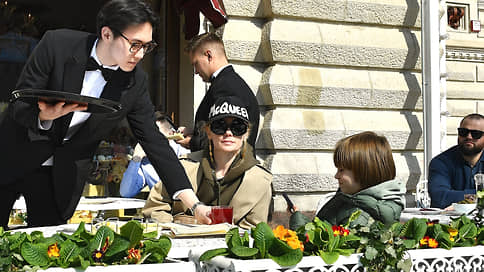The restaurant market of St. Petersburg is recovering faster than in Moscow
[ad_1]

An almost 25% year-on-year increase in the flow of hotel customers supported the restaurant market in St. Petersburg. In April-May, the number of orders in the institutions of the city was only 1% lower than last year, while in Moscow the gap is estimated at 9%. St. Petersburg attracts tourists as a kind of “alternative to Europe”. At the same time, the restaurateurs themselves perceive the city’s market as “difficult and less profitable”, compared to the capital.
In April-May, the number of orders in restaurants in Moscow was 9% lower than last year, and in St. Petersburg – only 1%, calculated in Focus Technologies.
The trend is also confirmed in the “Hochu Puri” network, speaking of more positive dynamics in the market of St. Petersburg. Unirest LLC (the master franchisee of KFC and Rostic’s) also says that sales in St. Petersburg in April-May were better than in Moscow. Mikhail Goncharov, the founder of the Teremok network, calls the trend pronounced, noting that other companies that operate simultaneously in two markets are paying attention to it. He also sees a noticeable increase in traffic in Kazan and Sochi. For the Anderson network, the figures coincide with the general trend: in Moscow, the number of orders in establishments decreased by 8%, although the delivery segment is growing.
The number of orders in restaurants in Moscow and St. Petersburg began to decline in March 2022, after the outbreak of hostilities in Ukraine. Mikhail Vasiliev, head of research and consulting at Focus Technologies, recalls that at one of the peaks at the end of March, the gap relative to the values of 2021 reached 11-13%, and in the fall – 15-19%.
“Now the St. Petersburg market, in our opinion, has actually recovered and is on a par with last year, while the Moscow market is still in stagnation,” the expert notes.
Mikhail Vasiliev explains the more pronounced recovery of the St. Petersburg market by the growth of the tourist flow: the location is considered as an alternative to European countries, including short trips to the city on weekends and holidays. Tourists have also been attracted by the celebration of the city’s 320th anniversary this year, he added.
In Moscow, according to the expert, additional restrictive measures taken, in particular, on the eve of May 9, did not contribute to the influx of guests. Mikhail Goncharov draws attention to the fact that before the pandemic, mass festivals created additional traffic in Moscow, which this year is noticeably less than in 2019.
According to Rosstat, the number of guests in collective accommodation facilities in St. Petersburg in January-April increased by 24.1%, to 1.3 million people year-on-year. In Moscow, the figure increased by 8%, to 3.4 million guests, in the whole country – by 16.6%, to 21.2 million people.
The general director of the Dolphin tour operator, Sergey Romashkin, estimates the growth in the flow of tourists to Moscow in the spring at 7-8%, and in St. Petersburg – at 16-17%. “Domestic trends sometimes come into fashion, this is the case here,” he notes.
In I Want Puri, an additional factor is the presence of understandable democratic concepts in St. Petersburg. Gagawa CEO Lenar Kutlin says that the restaurant market as a whole is positively affected by the gradual recovery in shopping mall traffic and the effect of pent-up demand. He does not rule out that the dynamics of the market in St. Petersburg in the summer will be good, but recalls that work in the city remains difficult for restaurateurs. “Rent rates here are quite high, comparable to Moscow, and the purchasing power is somewhat lower,” he explains. According to Mr. Kutlin, the restaurant business in St. Petersburg may be less profitable than in Moscow.
Mikhail Vasiliev says that the lack of noticeable income growth remains a constraint for the restaurant market, which forces people to save money, and largely due to entertainment. But he expects further traffic growth in both Moscow and St. Petersburg this year. Mikhail Goncharov expects Moscow to improve its tourist attraction. But Anderson does not yet see the prerequisites for positive traffic dynamics, noting that seasonal fluctuations persist, but are superimposed on the general negative trend.
[ad_2]
Source link





